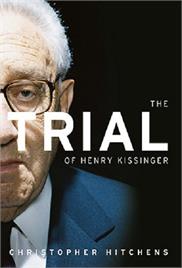Be Careful of Fake Websites. Always use HindiMovies.to domain & Join our Telegram Channel for Latest Updates.

Likes: 0
Views: 1.46K
Part contemporary investigation and part historical inquiry, documentary follows the quest of one journalist in search of justice. The film focuses on Christopher Hitchens’ charges against Henry Kissinger as a war criminal – allegations documented in Hitchens’ book of the same title – based on his role in countries such as Cambodia, Chile, and Indonesia. Kissinger’s story raises profound questions about American foreign policy and highlights a new era of human rights. Increasing evidence about one man’s role in a long history of human rights abuses leads to a critical examination of American diplomacy through the lens of international standards of justice.
Duration: 80 min
Released: 2003
IMDb Rating: 7.7/10 (1,557 Votes)
Genre: Documentaries
Stars: Brian Cox, Anna Chennault, Amy Goodman, Alexander Haig
Directors: Eugene Jarecki
Writers: Alex Gibney, Christopher Hitchens
Year: 2002
Server 1 – Youtube
Server 2 – Youtube
The Trials of Henry Kissinger is a compelling documentary film released in 2002 that delves into the controversial life and career of Henry Kissinger, one of the most influential and divisive figures in American foreign policy. Directed by Eugene Jarecki, this documentary provides a critical exploration of Kissinger's role in shaping U.S. international relations during the Cold War era, scrutinizing his decisions and legacy through detailed investigation and personal accounts.
The film essentially serves as a deep dive into the geopolitical maneuvers and covert operations that defined Kissinger's tenure as National Security Advisor and Secretary of State under Presidents Richard Nixon and Gerald Ford. It challenges viewers to consider the moral and legal issues surrounding his policies, which have provoked intense debate among historians, political analysts, and the general public alike.
Plot and Themes
"The Trials of Henry Kissinger" does not follow a traditional narrative story but rather functions as an investigative documentary. Through interviews, archival footage, and expert testimonies, the film pieces together a portrait of Kissinger's political persona and the decisions he made that had vast and often devastating effects on countries such as Chile, Vietnam, Cambodia, East Timor, and Bangladesh.
The documentary scrutinizes allegations of war crimes and human rights abuses linked to Kissinger's policies, including support for coups and authoritarian regimes. It raises difficult questions about accountability and justice, encouraging viewers to rethink established historical narratives and to assess the consequences of realpolitik and Cold War-era diplomacy.
Main Contributors
Critical Reception and Impact
The Trials of Henry Kissinger received attention for its fearless and unvarnished examination of a towering political figure. Critics praised the documentary for its balanced approach, combining meticulous research with powerful storytelling. This film has sparked dialogue about ethics in foreign policy and the extent to which individuals in power should be held accountable for their actions on the global stage.
The documentary also serves as an educational tool, making it frequently used in academic settings to discuss international relations, ethics, and modern history. Its detailed exploration of the Cold War's darker chapters challenges viewers to reflect on the human cost behind diplomatic decisions and political strategy.
Style and Presentation
The film employs a variety of documentary techniques, including interviews with journalists, activists, scholars, and people affected by Kissinger's policies. The use of archival footage punctuates the narrative, giving a visual account of historical moments and placing Kissinger's personality and politics in context. The narration by Brian Cox is measured yet evocative, guiding the viewer through complex political terrain with clarity and depth.
Conclusion
In sum, "The Trials of Henry Kissinger" is a vital documentary for those interested in political history, international affairs, and justice. It challenges the audience to critically evaluate not only Henry Kissinger’s legacy but also the broader implications of political power and accountability. Through its investigative rigor and compelling presentation, the film remains a significant work that continues to resonate with viewers more than two decades after its release.